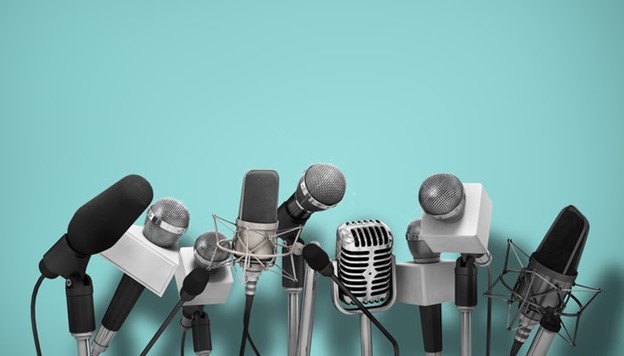
07 Oct Don’t Do These Specific Things During Your Next Media Interview
When it comes to building your company’s visibility and credibility, media coverage can be an extremely valuable, effective and efficient way to accomplish this. But, if mishandled, a media interview can cause significant damage to the company’s brand, services, and reputation. Company leaders must be prepared when such opportunities arise to ensure the absolute best outcomes.
Understandably, not everyone is naturally comfortable when it comes to doing media interviews. Unfortunately, we have all seen some poorly executed interviews at least once or twice in our life. To help you prepare, we compiled a few tips on what not to do during your next media interview:
- Don’t Come Unprepared
We want you to have the best interview possible, and just the same as if you were taking a quiz or test (although don’t worry, media interviews are not nearly as stressful), you would want to prepare. Know the media outlet, check out some of their interviews online, know the person interviewing you and what their style is like. You want to appear as though you’re almost ‘friends’ or familiar with them to show chemistry or rapport, which will make the interview more natural and compelling.
- Don’t Memorize What You’re Going to Say
We applaud your talking points and preparation (hence the point above), but we want to ensure that you don’t attempt to memorize what you want to say in the interview. This pitfall to avoid is because news interviews can be more of a conversational exchange versus a set Q & A session. Even with talking points, the reporter could ask different questions than predicted, and if you’ve attempted to memorize, you might feel caught off-guard. Additionally, memorization plus stress makes a recipe that could lead to forgetting specific points and realizing this on-camera or during the interview (queue the deer-in-headlights look).
- Don’t Skip the Production
The news has producers to edit video, produce articles and run radio conversations. But that doesn’t mean that you can’t play a role in the production. What that means is that you have control over lighting and microphone (in the case of a Zoom interview), your visual background (think professional and adding a touch of décor), and your own personal branding and presence. For example, if you have a book, have it nicely displayed behind you during your interview. Think about purchasing a desktop light to help with lighting as well as your light source, which you always want to have in front of you versus behind. Also, make sure that your camera for a Zoom interview is at eye-level and stabilized (the audience doesn’t want to see nostrils or shakiness).
- Don’t Over-Answer
The foolproof way to go through an interview is to keep your responses simple and to the point. This reduces chances of over speaking or getting off-topic. Journalists can be restricted by word count, so if your answers are too long, they may never make it to (online) print, and you can risk being taken out of context. Offer direct, short, and informative responses.
- Don’t Use Jargon
Remember, you are being interviewed because you are seen as an expert in your field. Most people don’t know the complexities of your work or industry so, in order to get your message across, use language that everyone can understand (think 4th-grade education type wording).
- Don’t Over-Sell
News interviews are just that – they are not advertisements. But don’t worry, we know that participating in news interviews means you will have greater sales. Make sure that your interview comes across as helpful, informative and or educational versus selling your service or product. Having an interview more on the helpful side will ensure an interesting interview that people will actually want to read or watch and an increased chance that you will be asked to return as a guest interviewee again.
- Don’t Forget You’re ‘ON’
This goes especially for Zoom interviews with multiple people involved, don’t forget that even when you’re not speaking, the camera can still capture your reaction. Have a genuine response or smile, and remember that the camera could be capturing everything. Avoid touching hair, jewelry or fidgeting just because you think the camera isn’t on you. Additionally, for radio interviews, you can still be ‘on’ when the host is speaking, so make sure you only speak or that you’re unmuted when ready. Last, print journalists can always report on what they see in your business or organization, so every piece of the interview is critical (how you interact with employees, customers, the cleanliness of your desk even!). Basically, you’re always ‘on’ during a media interview.
- Don’t Dodge or Go Off-Record
We’ve all heard the phrase ‘no comment’ before, and it always has a negative effect. Why? Because it implies avoidance. Your audience will assume the worst from it since it gives room to speculation. An advisable alternative would be something in the lines of “I don’t have any information to share right now on that matter, but what I can tell you is…”. Additionally, getting too comfortable with the media can cost you more than you can imagine. In theory, talking off the record can build better relationships with reporters, but it’s too big of a risk to take, and often unnecessary. Always assume that all you say will be published word for word and act accordingly.
Conclusion
Journalists are always looking for a good story, and you have a role to play in making your interview successful. Stay clear of these pitfalls, stick to your message, and keep your answers informative and concise.
If you want to be ready when it comes to media interviews and would like to learn more, go to our blog. If you would like a free consultation with NSPR, call us at (813) 865-3093.


Sorry, the comment form is closed at this time.